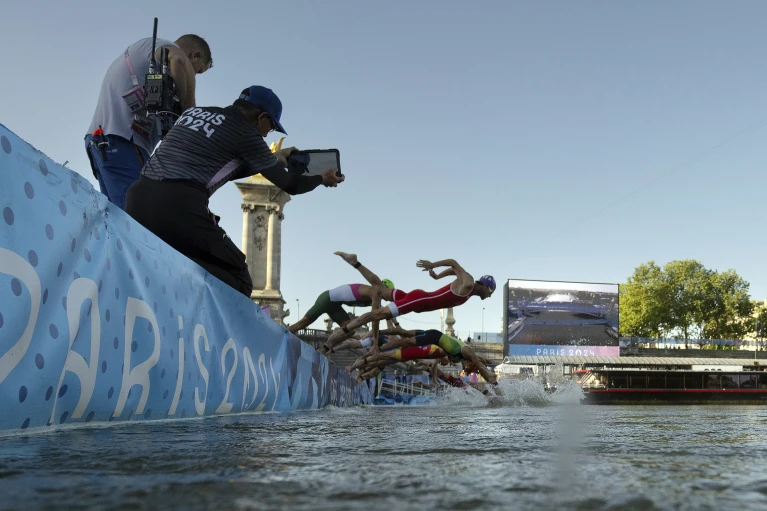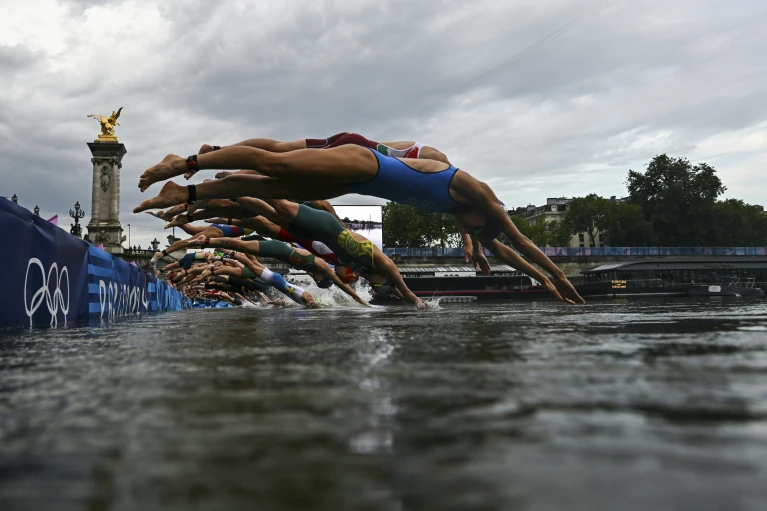
Open water swimmers have been authorized to train in the Seine River in preparation for the upcoming 10-kilometer marathon event.
On August 8, 2024 by editor1 StandardPARIS (AP) — Olympic open water swimmers have been given the green light to train in the Seine River on Wednesday, following assurances from Paris organizers that it is now safe to do so.
A two-hour training session is scheduled, offering swimmers the opportunity to get accustomed to the course that winds through the heart of Paris. However, it’s unclear how many athletes will participate in this session, which is set to take place one day before the women’s 10-kilometer marathon event. The men’s race is scheduled for Friday.

The training was previously postponed on Tuesday due to concerns over fluctuating bacteria levels in the Seine. Despite extensive efforts to improve water quality, concerns persist about the river’s safety.
Open water swimmers typically train in controlled pool environments, so some athletes might opt out of the Seine training session, preferring to focus on the actual competition. Nonetheless, some swimmers may want to adapt to the river’s conditions, including its strong currents.
Triathlon events have already been held in the Seine, although the schedule has been adjusted based on daily water quality readings. For the marathon swims, which involve covering a 10-kilometer (6.2-mile) distance with six laps of a 1.67-kilometer (1-mile) course, a backup plan is in place. If the Seine is deemed unsafe, the races would be relocated to the Vaires-sur-Marne Nautical Stadium, the venue for rowing and canoeing events.

The triathlon mixed relay event was completed on Monday. According to World Triathlon, water quality data from Tuesday showed that fecal bacteria levels were within acceptable limits during the relay course.
Paris Mayor Anne Hidalgo, who previously swam in the Seine to demonstrate improved water quality, expressed confidence in the preparations. “The recent favorable weather has contributed to better water quality,” she said. “To those who doubt that a river can be cleaned, I say, ‘Yes, it’s possible; we have done it.’”
Swimming in the Seine has been prohibited since 1923 due to pollution. The city has invested approximately 1.4 billion euros ($1.5 billion) in infrastructure upgrades, including constructing a large basin to capture excess rainwater, renovating sewer systems, and enhancing wastewater treatment facilities.
Water quality in the Seine is affected by weather conditions. Heavy rainfall can lead to increased bacteria levels due to runoff and wastewater, while warm, sunny weather helps to lower these levels.
During the Games, the weather has mostly been hot and sunny, though there have been instances of heavy rain. Some triathletes from last week’s races reported illness afterward, but it is unclear if the water quality was a factor.
Most strains of E. coli and enterococci are harmless, but certain types can cause infections if ingested, highlighting the importance of monitoring water quality.
You may also like
Archives
Calendar
| M | T | W | T | F | S | S |
|---|---|---|---|---|---|---|
| 1 | 2 | 3 | 4 | 5 | 6 | |
| 7 | 8 | 9 | 10 | 11 | 12 | 13 |
| 14 | 15 | 16 | 17 | 18 | 19 | 20 |
| 21 | 22 | 23 | 24 | 25 | 26 | 27 |
| 28 | 29 | 30 | 31 | |||
Leave a Reply